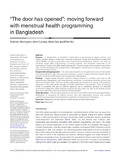| dc.contributor.author | Warrington, Siobhan | |
| dc.contributor.author | Coultas, Mimi | |
| dc.contributor.author | Das, Mitali | |
| dc.contributor.author | Nur, Effat | |
| dc.coverage.spatial | Bangladesh | en |
| dc.date.accessioned | 2021-10-28T11:17:42Z | |
| dc.date.available | 2021-10-28T11:17:42Z | |
| dc.date.issued | 2021-10-25 | |
| dc.identifier.citation | Warrington, S.; Coultas, M.; Das, M. and Nur, E. (2021), '“The Door has Opened”: Moving Forward with Menstrual Health Programming in Bangladesh', International Journal of Human Rights in Healthcare, Vol. 14 No. 4, pp. 296-310, DOI: 10.1108/IJHRH-11-2020-0102 | en |
| dc.identifier.uri | https://opendocs.ids.ac.uk/opendocs/handle/20.500.12413/16908 | |
| dc.description | Introduction
Half of the global population will menstruate for a significant portion of their lives, yet around the world this normal and natural process is surrounded by stigma, shame and silence. Despite being a critical part of women’s and girls’ reproductive health, menstruation remains significantly under-researched and addressed (Bobel, 2020). The last decade, has, however, seen menstruation gain increasing recognition within research, programming, and policy. The United Nation’s (UN) Special Rapporteur on the Human Rights to Water and Sanitation first began to consider menstruation under the remit of water, sanitation and hygiene (WASH) following a visit to Bangladesh in 2009. She explains: “my visit to Bangladesh informed the rest of my mandate in terms of the needs of menstruating girls and women, not just in schools but across all aspects of their lives, at home, in the workplace and beyond. Menstrual hygiene and health became an additional consideration to be included within the requirements of the human right to sanitation” (Roaf and de Albuquerque, 2020). Menstrual health has since been included in UN resolutions relating to the right to water and sanitation. For example, in 2018 the Human Rights Council called upon states to: “address the widespread stigma and shame surrounding menstruation and menstrual hygiene by ensuring access to factual information thereon, addressing the negative social norms around the issue and ensuring universal access to hygienic products and gender-sensitive facilities […]” (UN General Assembly, 2018). Menstrual health is also recognised as key for women and girls to realise many other rights, including the rights to health, education, work, and non-discrimination and gender equality (Human Rights Watch and WASH United, 2017). However, menstruation is often still viewed in sector siloes rather than from a rights-based, menstruator-centric perspective (Global South Coalition for Dignified Menstruation, 2020), and holistic approaches to improving menstrual health (MH) are lacking. Much remains to be done to improve the experiences and rights of those who menstruate everywhere. This case-study examines and reflects upon menstruation-related programming in Bangladesh to review the progress, challenges, and potential ways forward. | en |
| dc.description.abstract | Purpose: In Bangladesh, as elsewhere, menstruation is surrounded by stigma, silence, and shame. Despite being a critical part of women’s and girls’ sexual and reproductive health and rights (SRHR), it remains significantly under-researched and addressed. However, the focus on menstrual health (MH) programming is growing globally, with increased awareness of the importance of holistic and rights-based approaches. This case study aims to examine and reflect upon the MH landscape and programming in Bangladesh, assessing the progress, challenges, and potential ways forward. Design/methodology/approach:
This case study is based on a non-systematic review of recent global and national literature, eight semi-structured interviews, a review of national television adverts and the authors’ experiences of MH research and programming in Bangladesh. Findings:
Hygiene-based education delivered through schools is a common entry point for MH programming in Bangladesh, with limited activities conducted in communities (including with men and boys) and through media. The focus of MH programming has tended to be narrow, with insufficient recognition of the wider gender equality and health implications of menstruation. There are growing efforts to coordinate MH work by different agencies and to collectively advocate for increased government engagement. While significant progress has been made, this case study identifies several gaps and tensions that reflect the complexity of addressing MH. Originality/value: This case study presents an overview of recent MH experiences and programming in Bangladesh. It recognises the different sectors, sites and stakeholders involved, and includes experiences and perspectives of practitioners, academics, and programme participants. | en |
| dc.description.sponsorship | Sida | en |
| dc.language.iso | en | en |
| dc.publisher | Emerald Publishing Limited | en |
| dc.relation.ispartofseries | International Journal of Human Rights in Healthcare;Volume 14, Issue 4 | |
| dc.rights.uri | http://creativecommons.org/licenses/by/4.0/ | en |
| dc.subject | Gender | en |
| dc.subject | Health | en |
| dc.title | “The Door has Opened”: Moving Forward with Menstrual Health Programming in Bangladesh | en |
| dc.type | Article | en |
| dc.rights.holder | Copyright © 2021, Siobhan Warrington, Mimi Coultas, Mitali Das and Effat Nur. | en |
| dc.identifier.externaluri | https://www.emerald.com/insight/content/doi/10.1108/IJHRH-11-2020-0102/full/html | en |
| dc.identifier.doi | 10.1108/IJHRH-11-2020-0102 | |
| dcterms.dateAccepted | 2021-07-21 | |
| rioxxterms.funder | Default funder | en |
| rioxxterms.funder | Default funder | en |
| rioxxterms.identifier.project | Default project | en |
| rioxxterms.identifier.project | Default project | en |
| rioxxterms.version | VoR | en |
| rioxxterms.versionofrecord | 10.1108/IJHRH-11-2020-0102 | en |
| rioxxterms.funder.project | 9ce4e4dc-26e9-4d78-96e9-15e4dcac0642 | en |
| rioxxterms.funder.project | 9ce4e4dc-26e9-4d78-96e9-15e4dcac0642 | en |


